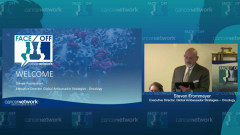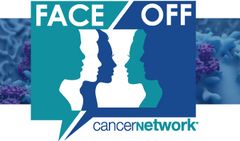
Adoption of Pediatric-Inspired ALL Regimens by Adult Oncologists
Reem Akel, MD, presents a population-based study on the adoption of pediatric-inspired acute lymphoblastic leukemia (ALL) regimens by adult oncologists.
Episodes in this series

Bijal D. Shah, MD: [Next up we have] Reem Akel. These are some of our superstar fellows. Reem is a first-year fellow who just finished her clinic rotation with me focusing on acute lymphoblastic leukemia. She doesn’t know it yet, but she’s going to become an acute lymphoblastic leukemia [ALL] specialist.
Reem Akel, MD: Hi, everyone. Thank you for having me. The first article that I’m presenting is by [Lori] Muffly, [MD, MS], et al, which is the adoption of a pediatric-inspired acute lymphoblastic leukemia regimen by adult oncologists treating adolescents and young adults. This is a population-based study.
As a brief background, we know that retrospective analyses and historical comparators have suggested that AYA [adolescent and young adult] patients with ALL have superior outcomes when treated with pediatric treatment protocols. But we also know that the pediatric ALL regimens are more intensive and highly regimented than adult regimens. The objective of this study was to provide a population-based description of the ALL treatment patterns in these AYA individuals. This study obtained data from the Greater Bay Area Cancer Registry and looked at AYA patients aged 15 to 39 years who were diagnosed with ALL between 2004 and 2014. The treating facilities were then designated as being either pediatric or adult centers, and the induction treatment regimens were categorized as adult vs pediatric or pediatric-inspired ALL regimens.
They were able to identify 304 patients who were diagnosed between that time, of which we had 296 who had an identifiable treatment setting: 207 were treated in an adult setting, and 89 were treated in a pediatric setting. Of the 207 in the adult setting, we only had complete treatment data for 149 of those. We had 56 with incomplete treatment data, and 2 patients died prior to receiving any treatment. They found that the patients in the youngest AYA group between the ages of 15 to 18 were predominantly treated in pediatric settings. The older AYA individuals were mostly treated in adult settings. It becomes interesting in the transition between the ages of 18 and 34. They were mostly being treated in adult settings, but there was a shift with time to include some more pediatric settings.
Focusing on the AYA patients who were being treated in adult settings, which was a total of 149, we see that the majority of them, 79%, were getting adult ALL regimens, the most common of which being hyper-CVAD [cyclophosphamide, vincristine, doxorubicin, dexamethasone]. Only 21% were being treated with pediatric-inspired regimens. Those who were treated before 2008 were exclusively treated with adult ALL regimens. But then between 2008 and 2012, there are 31% who started to receive pediatric-inspired regimens. That’s primarily attributed to the opening of the United States adult intergroup trial, C10403. When that trial had closed off to accrual in 2013 or 2014, this number dropped down a bit to 21%.
What are the strengths of this study? It’s a population-based data set that enabled inclusion of AYA patients with ALL coming from a variety of racial, ethnic, and socioeconomic backgrounds in California. However, it has some limitations. As we saw, it has incomplete treatment data for some of these patients. The sample size was too small and didn’t allow for doing things like multivariate modeling of independent factors to see why there’s a choice of a pediatric regimen in the adult setting.
The results are based on patients in Northern California, which may not necessarily represent the AYA patients with ALL or practice patterns across the whole of the United States. Additional research is needed to determine the factors that would contribute to the treatment selection for AYA patients with ALL by adult oncologists. Lastly, all of that was prior to the publication of the CALGB [Cancer and Leukemia Group B] trial in 2019. Our Memorial [Sloan Kettering Cancer Center] colleagues will be talking about some of those. It would be nice to have this study later on to see if that had impacted the trends and decisions.
Transcript edited for clarity.
Newsletter
Stay up to date on recent advances in the multidisciplinary approach to cancer.








































